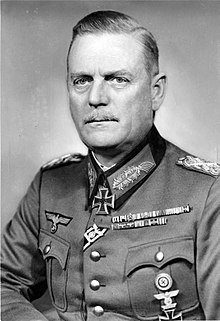Wilhelm Keitel

Wilhelm Bodewin Johann Gustav Keitel (September 22, 1882 – October 16, 1946) was a German field marshal and war criminal who held office as chief of the Oberkommando der Wehrmacht (OKW), the high command of Nazi Germany's Armed Forces, during the Second World War. In that capacity, Keitel signed a number of criminal orders and directives that led to numerous war crimes. Keitel's rise to the Wehrmacht high command began with his appointment as the head of the Armed Forces Office at the Reich Ministry of War in 1935. Having taken command of the Wehrmacht in 1938 Hitler replaced the ministry with the OKW and Keitel became its chief. He was reviled among his military colleagues as Hitler's habitual "yes-man".
After the war, Keitel was indicted by the International Military Tribunal in Nuremberg as one of the "major war criminals". He was found guilty on all counts of the indictment: crimes against humanity, crimes against peace, criminal conspiracy, and war crimes. He was sentenced to death and executed by hanging in 1946.
Quotes[edit]
- I call on God Almighty to have mercy on the German people. More than two million German soldiers went to their death for the fatherland before me. I follow now my sons - all for Germany.
- Last words, 10/16/46, quoted in "The Mammoth Book of Eyewitness World War II" by Jon E. Lewis - History - 2002
- I am a soldier and I worked for the kaiser, under Ebert, Hindenburg, and Hitler, all the same way, for the past 44 years.
- To Leon Goldensohn, March 27, 1946, from "The Nuremberg Interviews" by Leon Goldensohn, Robert Gellately - History - 2004
- I believe German soldiers are good and decent, and if they did anything wrong it was because of military necessity.
- To Leon Goldensohn, March 27, 1946, from "The Nuremberg Interviews" by Leon Goldensohn, Robert Gellately - History - 2004
- Hitler gave us orders - and we believed in him. Then he commits suicide and leaves us to bear the guilt. He should have remained alive to bear his share.
- To Leon Goldensohn, April 6, 1946, from "The Nuremberg Interviews" by Leon Goldensohn, Robert Gellately - History - 2004
- It isn't right to be obedient only when things go well; it is much harder to be a good, obedient soldier when things go badly and times are hard. Obedience and faith at such time is a virtue.
- To Leon Goldensohn, May 17, 1946, from "The Nuremberg Interviews" by Leon Goldensohn, Robert Gellately - History - 2004 - Page 166
- Death by hanging. That, at least, I thought I would be spared.
- After receiving the death sentence, quoted in "Nuremberg Diary" by G. M. Gilbert - History - 1995
- Why did the generals who have been so ready to term me a complaisant and incompetent yes-man fail to secure my removal? Was that all that difficult? No, that wasn't it; the truth was that nobody would have been ready to replace me, because each one knew that he would end up just as much a wreck as I.
- Excerpt from "The Memoirs of Field-Marshal Keitel" - Page 52 - by Wilhelm Keitel - 1966
- It is tragic to have to realize that the best I had to give as a soldier, obedience, and loyalty, was exploited for purposes which could not be recognized at the time, and that I did not see that there is a limit set even for a soldier's performance to his duty. That is my fate.
- Statement issued at Nuremberg, 1946. Quoted in "The Trial of the Germans" - Page 341 - by Eugene Davidson - History - 1997
- The Führer has ordered that the enemy employs in partisan warfare Communist-trained fanatics who do not hesitate to commit any atrocity. It is more than ever a question of life and death. This fight has nothing to do with soldierly gallantry or principles of the Geneva Convention. If the fight against the partisans in the East, as well as in the Balkans, is not waged with the most brutal means, we will shortly reach the point where the available forces are insufficient to control the area. It is therefore not only justified, but it is the duty of the troops to use all means without restriction, even against women and children, so long as it ensures success. Any consideration for the partisans is a crime against the German people.
- December 16, 1942. Quoted in "The Second World War: A Complete History" - Page 386 - by Sir Martin Gilbert - History - 2004
About Keitel[edit]

- If you want my own plain opinion about Keitel's orders, I will tell you. They were the orders of a stupid follower of Hitler. I myself paid very little attention to them and I think any attempt to justify his orders would be a mistake on the part of those of us who are steeped in military tradition and good conduct. I trust you will not quote me on these observations. I knew Keitel fairly well and I think that he is a decent person. It was simply that Hitler wanted a weak general in that powerful position in order to be able to have complete control of him. If I had held Keitel's position under Hitler, I wouldn't have lasted two weeks.
- Ewald von Kleist, to Leon Goldensohn, June 12, 1946
- A field marshal who issued orders to the armed forces but had no idea of the results they would have in practice.
- Keitel, the weak and willing tool, delivered the armed forces, the instrument of aggression, over to the party and directed them in executing its felonious designs.
- Robert H. Jackson
